Paramedics learn from Thailand experience
Author: Bruce Andrews
Publication Date: Thursday, 7 Aug 2014
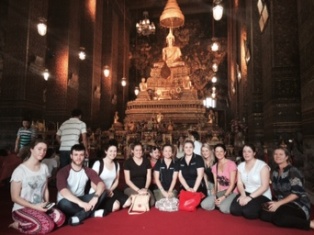 A group of paramedic students has returned to studies at Charles Sturt University (CSU) after an exhilarating few weeks experiencing hospital and emergency medical services in Thailand.
A group of paramedic students has returned to studies at Charles Sturt University (CSU) after an exhilarating few weeks experiencing hospital and emergency medical services in Thailand.
The students were accompanied by Ms Tania Johnston, lecturer in paramedics at the CSU School of Biomedical Sciences in Port Macquarie, and Dr Nua Wongtongkam, a CSU lecturer originally from Bangkok who has experience working with the United Nations and the World Health Organisation.
Paramedic student Ms Ebony Langdon from CSU in Port Macquarie said, "It was an opportunity of a life time to be able to go to a developing country like Thailand to experience and observe their ambulance systems, and to compare the similarities and differences with those in Australia. There were many highlights for me, including using clinical skills while working shifts with several different ambulance services."
Ms Langdon said a particular highlight was the opportunity to work in the emergency room and labour and delivery wards in a busy Thai hospital, because it gave her an insight into what happens after the patient has been delivered to hospital by ambulance, which paramedics in Australia do not really get to see. Other Highlights included riding elephants, patting tigers and exploring Bangkok, Nakhon Ratchasima and Chiang Mai.
Mr Damian O'Brien, a double degree paramedic and nursing student at CSU in Bathurst agrees.
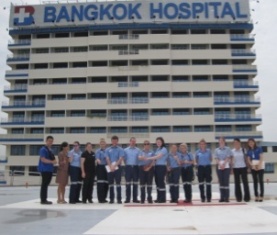 "Participating in the CSU Global paramedic study tour to Thailand provided a rare undergraduate opportunity to experience emergency healthcare in an international setting," he said. "The clinical interaction with numerous Thai hospital and ambulance services broadened my perspective regarding both my studies and my appreciation of Thai culture in general."
"Participating in the CSU Global paramedic study tour to Thailand provided a rare undergraduate opportunity to experience emergency healthcare in an international setting," he said. "The clinical interaction with numerous Thai hospital and ambulance services broadened my perspective regarding both my studies and my appreciation of Thai culture in general."
Before they began their working visits to a number of hospitals and ambulance services, the eleven students and two lecturers toured Bangkok to adjust to the new culture and get to know each other better in preparation for the weeks ahead. They toured famous temples, the Grand Palace, and took a boat tour down the Chao Phraya River.
Bangkok Hospital, operated by Dusit Medical Group, a private organisation that owns a number of hospitals and provides first-class medical services to many expatriates and travelers, was the first to host the students in its emergency department, aviation program, and on ambulance transports.
Language no barrier, traffic exhilarating
Ms Johnston said, "Everywhere we went, the hospital and ambulance staff were amazing and made us feel so welcome.
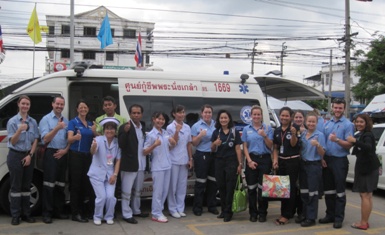 "They were generous with their language skills and knowledge, and gave us an unforgettable experience. They provided us with fantastic translators and shared much about Thai culture, as well as the history of EMS in Thailand."
"They were generous with their language skills and knowledge, and gave us an unforgettable experience. They provided us with fantastic translators and shared much about Thai culture, as well as the history of EMS in Thailand."
The students also had a detailed day-long educational tour of hospitals and ambulance services with the Ministry of Public Health's National Institute for Emergency Medicine (NIEMS). The institute is responsible for developing emergency medical service (EMS) standards in Thailand, as well as licensing paramedics and providing administrative oversight under the EMS Act (2008).
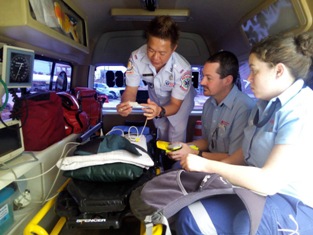 On the third day the students spent time at Ratchavithi Hospital and EMS service, as well as with Pho Teck Tung, a private, not-for-profit ambulance service that was founded by the Chinese immigrants in 1904. For the next two days, the students rotated shifts between two hospitals and three emergency medical services. For many of the students this was an eye-opening first exposure to 'real patients'.
On the third day the students spent time at Ratchavithi Hospital and EMS service, as well as with Pho Teck Tung, a private, not-for-profit ambulance service that was founded by the Chinese immigrants in 1904. For the next two days, the students rotated shifts between two hospitals and three emergency medical services. For many of the students this was an eye-opening first exposure to 'real patients'.
The students were exhilarated by the Thai traffic and driving style while travelling in the back of the ambulances. They attended to patients who had experienced electrocution, motor scooter accident trauma, stabbings, falls, heart attacks, strokes, seizures, and psychiatric episodes among other conditions. Even without a translator and no common language between them, local paramedics and the students worked well together, established a great camaraderie, and shared many laughs.
Going up-country: labour, births and scooter accidents
In the second week, the students travelled west to Korat in Nakhon Ratchasima province. The first day included a tour of the Maharat Hospital, which then extended to a guided tour of Phimai Historical Park, a religious sanctuary built in 11th to 12th century AD. The students spent the next three days gaining valuable clinical experiences in the hospital and pre-hospital settings, with rotating shifts through the emergency department and labour/delivery wards, as well as the hospital ambulance and not-for-profit EMS services.
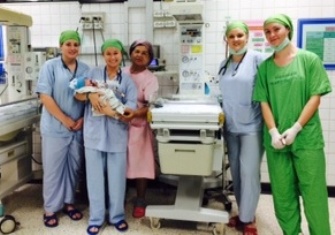 In the labour and delivery room the students witnessed many caesarian-sections and births, as well as gynecological surgery. They practiced assessments of newborn babies, and one student even assisted with a cesarean birth. Riding with the ambulances, the students responded to trauma and medical conditions; patients presented with hypoglycaemia, seizures, sprains, breathing problems, active labour, falls and more scooter incidents.
In the labour and delivery room the students witnessed many caesarian-sections and births, as well as gynecological surgery. They practiced assessments of newborn babies, and one student even assisted with a cesarean birth. Riding with the ambulances, the students responded to trauma and medical conditions; patients presented with hypoglycaemia, seizures, sprains, breathing problems, active labour, falls and more scooter incidents.
"It was unanimous that no-one wanted to ride a motorbike here after seeing so many patients arrive with head injuries," Ms Johnston said.
Their emergency department experience was confronting but rewarding, with periods of calm followed by chaos. The majority of students were able to practice drawing blood, intravenous cannulation, medication administration, and electro-cardiographs, among many other skills.
Further up-country: elephants, tigers and more scooter accidents
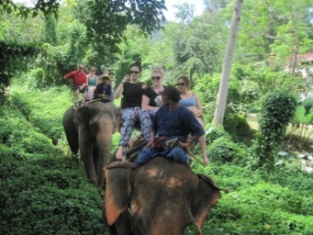 After leaving Korat, the study group spent a couple of days near Khao Yai National Park in the Nakhon Ratchasima Province, staying at the Eco Valley Lodge, a place with 'character' and plenty of geckos. Their guide arranged for a group elephant ride that meandered through the jungle and up a river, with everyone laughing while the elephants sprayed each other with water.
After leaving Korat, the study group spent a couple of days near Khao Yai National Park in the Nakhon Ratchasima Province, staying at the Eco Valley Lodge, a place with 'character' and plenty of geckos. Their guide arranged for a group elephant ride that meandered through the jungle and up a river, with everyone laughing while the elephants sprayed each other with water.
"The next day we had an escorted jungle trek seeing monkeys and various flora and fauna before enjoying an 'authentic' western dinner accompanied by a Thai 'country band' singing covers of Credence Clearwater Revival," Ms Johnston said.
The CSU group left Nakhon Ratchasima Province and arrived in Chiang Mai after a nine-hour van ride where they met more dedicated doctors and ambulance personnel while touring a local public hospital. Next, they toured the Ruam Jai Rescue private ambulance foundation, founded and primarily supported by the Chinese community who feel compelled to 'give back' to the Thai people who welcomed them to the country many years ago.
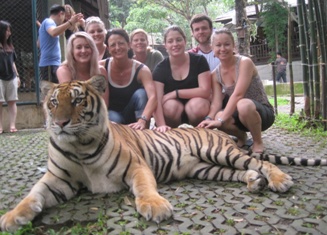 For the next few days the students primarily worked in pairs during their 'ride-alongs' on day and night shifts with this host ambulance service. Again, because they attended to so many accidents, the students were reminded of reasons not to ride a scooter or motorbike in Thailand. The CSU group was featured on the front page of the Chiang Mai News, and they enjoyed celebrity status everywhere they went in uniform. When not on duty with ambulances, the students explored the night bazaar, visited the Tiger Kingdom, and took full advantage of the inexpensive spa services.
For the next few days the students primarily worked in pairs during their 'ride-alongs' on day and night shifts with this host ambulance service. Again, because they attended to so many accidents, the students were reminded of reasons not to ride a scooter or motorbike in Thailand. The CSU group was featured on the front page of the Chiang Mai News, and they enjoyed celebrity status everywhere they went in uniform. When not on duty with ambulances, the students explored the night bazaar, visited the Tiger Kingdom, and took full advantage of the inexpensive spa services.
Student Ebony Langdon concluded, "I would definitely recommend other students to participate in this program. I had the time of my life in Thailand, and have many memories and experiences that I will never forget. I made new friendships with other students on the trip that will last a life time."
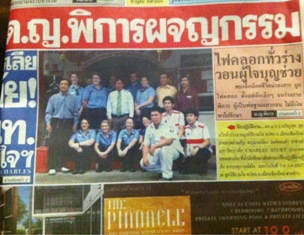 Fellow paramedic student Damian O'Brien agreed. "The organisation of the trip was excellent, with impeccable facilitation provided by the lecturers who accompanied us. I strongly recommend participating in similar adventures to any student who believes they may find such travel rewarding," he said.
Fellow paramedic student Damian O'Brien agreed. "The organisation of the trip was excellent, with impeccable facilitation provided by the lecturers who accompanied us. I strongly recommend participating in similar adventures to any student who believes they may find such travel rewarding," he said.
"All in all it was an amazing trip," Ms Johnston said. "I am very grateful to Dr Wongtongkam for using her contacts to set up such incredible clinical experiences, and for translating Thai for us throughout the trip. We made new friends, and have some very promising potential future partnerships to explore between Charles Sturt University, Bangkok Hospital, and the Ministry of Public Health as they continue to develop their EMS system and train undergraduate paramedics."
ends
Media contact: Bruce Andrews, (02) 6338 6084
Media Note:
Contact CSU Media to arrange interviews.
